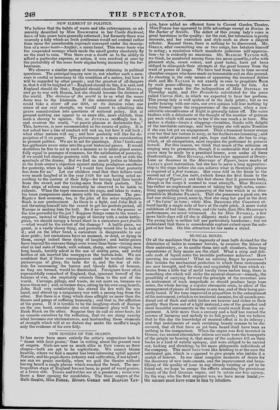MUSICAL BOXES.
OF all the machines that the ingenuity of man hath devised for the delectation of ladies in summer bowers, to sweeten the labour of their embroidery, or to soothe them into soft slumbers, these tiny repositories of fairy music are the chief. What a crisp and deli- cate rush of liquid notes the invisible performer achieves ! How unerring his execution ! What an untiring finger he possesses ! But besides the mechanical perfection to which these instruments are now brought, and the deep and exquisitely full tone which vi- brates from a little bar of metal hardly three inches long, there is something else which will strike the musical observer—namely, the possibility of carrying forward the principle of the invention into an instrument of sill magnitude as should produce large bass notes, the whole having a regular chromatic scale, to allow of the arrangement of pieces of harmony in any key, and of their being per- fectly tuned. If the tone improved in proportion to the enlargement of the instrument, (which is no irrational surmise, for all sounds pro- duced out of thick and solid bodies are heavier and richer in their quality than those out of a light material,) one of the grandest and most beautiful instruments in the world would result from the ex- periment. A little more than a century and a half has nursed the science of harmony and melody to its full growth ; but we believe that to this day the knowledge of musical effect is in its infancy ; and that instruments of such ravishing beauty remain to be dis- covered, that all that have as yet been heard shall have been as nothing in the comparison. When the organ was first invented in Greece, (as ancient chroniclers inform us) such were the transports of the people on hearing it, that many of the audience fell on their backs in a kind of extatic epilepsy, and were obliged to be carried out, kicking and shrieking, by the more phlegmatic individuals of the company. This must have been like drinking in at the ears the celebrated gas, which is supposed to give people who imbibe it a snatch of heaven. In our most sanguine moments of desire for the discovery of new instraments, and the improvement and beau- tifying of the quality of tone in any already existing or yet to be foudout, we hope to escape the effects attending the pernicious beauty of the first Grecian organ, and to retain our free agency. By the way, who the first organist was, we have never learnt ;— the §cience must have come to him by intuition.


















 Previous page
Previous page